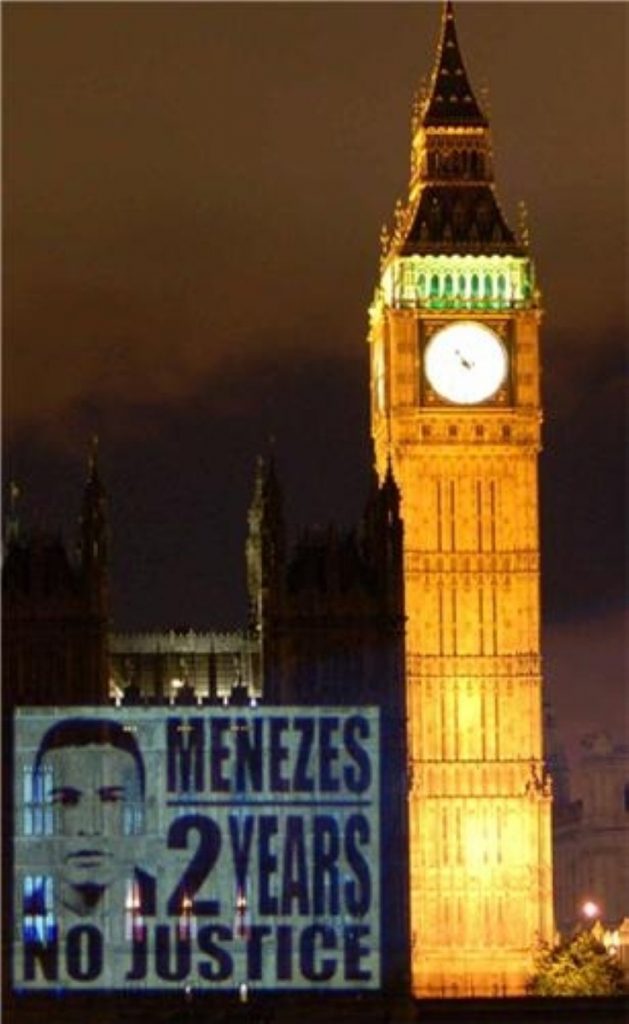Public ‘deliberately misled’ over De Menezes shooting
One of the UK’s top counter-terrorism officers “deliberately misled” the Metropolitan police commissioner Sir Ian Blair in the aftermath of the killing of Jean Charles de Menezes in 2005.
An Independent Police Complaints Commission (IPCC) has upheld the complaints made against Andy Hayman and said his conduct in the aftermath of the shooting raised “serious concern”.
The Metropolitan Police must now decide whether he is to face disciplinary action for failing to confirm Mr de Menezes was not a terror suspect.
However, complaints made against Metropolitan Police commissioner Sir Ian Blair have not been upheld.


In its investigation into the misinformation propagated by the Met after Mr de Menezes death, the IPCC found Sir Ian was not given the evidence that the wrong man was shot until the following day.
But, the IPCC said the Met should ask why the commissioner remained uninformed of key information on July 22.
Mr de Menezes was fatally shot by armed officers at Stockwell tube station on July 22 2005 after being mistaken for one of the terror suspects wanted in connection to the failed bombing of the London Underground.
The IPCC report today upholds complaints by Mr de Menezes’ family that the Met fed false information to the public on July 22 and wrongly claimed the Brazilian was acting strangely.
The commission found “significant weakness” in the way the Met handles critical information.
In the immediate aftermath of the shooting Sir Ian, the Metropolitan police commissioner, told the public Mr de Menezes was linked to the July 21 terrorist alert.
Sir Ian said at the time: “As I understand the situation the man was challenged and refused to obey police instructions”. A Scotland Yard statement added: “His clothing and his behaviour at the station added to their suspicions.”
However, in a private briefing at Scotland Yard officers admitted Mr de Menezes’ identity was still unclear, as was his connection to the previous terror attempt.
Sir Ian has always maintained he was not told of Mr de Menezes innocence until the day after the shooting, when he was briefed by counter-terrorism officer Mr Hayman.
On July 23 Sir Ian did make a public statement to confirm Mr de Meneze’s innocence.
However, the first statement clearing Mr de Meneze’s of terrorist links continued to falsely claim his behaviour had been suspicious.
The campaign group Justice 4 Jean maintains the police knew Mr de Menezes was not linked to any terrorist activities but did not make this information known to the public and deliberately smeared him by claiming he had acted suspiciously.
Aside from misidentifying the 27-year-old Brazilian as a Somalian or Ethiopian terrorist suspect, the police wrongly claimed Mr de Menezes had been wearing a bulky jacket, vaulted the ticket barrier at Stockwell Tube and ran onto a tube train in defiance of police commands to stop.
It was later confirmed Mr de Menezes was wearing light clothes, paused upon entering the tube station to pick up a newspaper, used a ticket to enter the station and only broke into a run when he saw a waiting tube train.
The IPCC said today: “There was no action he could have consciously taken that would have saved him.”
Mr de Menezes was wrongly identified as a potential suspect by surveillance officers monitoring a block of flats in Tulse Hill, south London.
The electrician was followed on a bus to Stockwell tube station, where he was pursued by armed police officers and shot seven times in the head.
Sir Ian initially tried to prevent an IPCC investigation, claiming this could compromise anti-terrorist procedure.
The full extent of the errors surrounding the case were made public thanks to a whistleblower within the IPCC.
An earlier IPCC report into the shooting itself has been withheld from the public pending an investigation under health and safety legislation.
The Crown Prosecution Services has already decided not to press charges against any individual officers over the shooting.
Today’s report, dubbed Stockwell Two, was rewritten at the 11th hour following a legal challenge from other officers that the IPCC had not followed its procedural guidelines.









